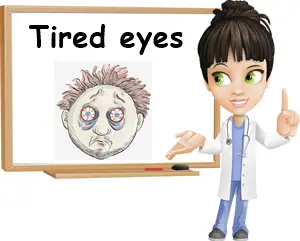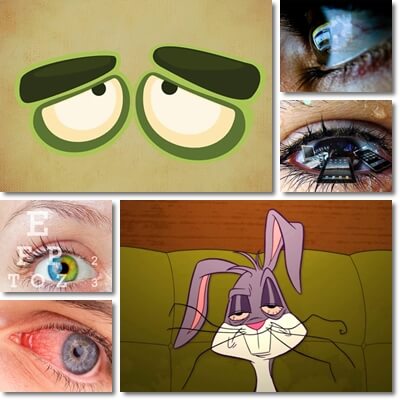Tired eyes is a common symptom of spending too much time in front of the computer, television, phone and other screens. It can occur as a result of sleep deprivation and fatigue or be a symptom of influenza. Very often, tired eyes are accompanied by other telling signs and symptoms such as headaches or dizziness, dark circles under the eyes, fever, grittiness, redness or floaters. Causes may be as innocuous as strain from reading, working or too much screen time overall and require only resting your eyes. However, if floaters impacting visual acuity or dizziness occur together with tired eyes, then causes may be more serious and should be investigated by a doctor.
Tired eyes because of computer and tired eyes because of sleep deprivation are the most common causes of eye fatigue. However, the range of symptoms may extend to include other manifestations such as redness and burning sensation or headaches and grittiness. Any additional symptom that may accompany the tired eyes sensation is relevant to identifying the underlying cause and setting the direction for adequate treatment. As such, here is what you may be experiencing along with eye tiredness and why:

List of symptoms
1) Gritty eyes sensation. Experiencing tired, gritty eyes is not normal. When your eyes feel gritty or it feels like you have sand in your eyes, it could be because of a condition called dry eye syndrome. This condition causes less tears to be produced which impacts eye health and vision quality. With dry eyes syndrome, you wake up with gritty, tired eyes in the morning or a feeling of having sand in the eyes and can’t see very well right away. Symptoms may become worse throughout the day due to the lack of sufficient tears. Sleeping with your eyes open causes inflammation and the same symptoms. Dry air, having a fan or vent directed at your face while you sleep or work, air pollution are possible causes as well.
2) Dark circles under the eyes. Dark circles under the eyes are often a hereditary trait passed down from your parents and designate a harmless hyperpigmentation of the area below the eyes. In such cases it is a cosmetic issue at most, depending on how prominent the hyperpigmentation is. But dark circles under the eyes that occur together with eye tiredness are usually caused by seasonal allergies, asthma, influenza or other infectious respiratory diseases, skin disorders such as eczema, sleep deprivation or low quality sleep, exhaustion, anemia, iron, vitamin B9 and B12 deficiencies. Usually, dark circles under the eyes become more prominent with age.
3) Puffiness or bags under the eyes. Puffy tired eyes may also be caused by water retention from a high sodium intake, alcoholism, liver problems, inflammation, lack of sleep or poor sleep quality, allergies, endocrine problems, thyroid disorders such as hypothyroidism and hyperthyroidism, conditions affecting the tear ducts, skin disorders that cause you to scratch the skin around the eyes such as dermatitis or that cause inflammation, such as cellulitis. Puffy eyes may also be a genetic trait, in which case they are usually just a cosmetic issue and not pathological. So if you’ve always had bags under the eyes, then they don’t represent a medical problem. But if it’s a new occurrence, for example, you one day get tired eyes and bags, then it’s worth looking at the causes behind it (see full article on puffy eyes and dark circles).

4) Dryness. Tired eyes and dry eyes may be a symptom of allergic reactions to pollen, dust or other airborne allergens. They could be caused by irritants from cleaning products, paints, pollutants and all sorts of chemicals. Tired, dry and gritty eyes could be caused by dry eye syndrome, autoimmune disorders such as Sjogren syndrome, severe nutritional deficiencies, especially vitamin A deficiency or be a side effect of eye surgery.
5) Burning feeling, redness. This is one of the most common combinations of symptoms and can be caused by reading too much, spending too much time in front of a screen, not getting enough sleep or coming into contact with irritant substances such as cleaning products, strong perfumes, paint vapors or air pollution. Seasonal allergies and going out on windy days, especially if the air is dry can also lead to tired eyes with burning and redness.
6) Headaches. Another fairly common occurrence is experiencing tired eyes and headache. In most cases, it’s a result of eye strain from poor lighting, air conditioning, reading too much, spending too much time in front of the computer, sleeping very little or wearing the wrong glasses. In rare cases, the headaches could indicate a brain pathology such as a tumor, so they are best investigated when they occur repeatedly and without an apparent reason.
7) Dizziness. Tired eyes can cause dizziness, either in the form of lightheadedness or vertigo. The accompanying lightheadedness can be a result of strain on the eyes, wearing the wrong glasses or be caused by an entirely different condition, unrelated to eye tiredness. If you experience tired eyes and vertigo, then causes may include eye strain, internal ear problems, migraines or more serious causes such as tumors or stroke. If you experience frequent dizziness or vertigo, especially if you have never had such symptoms before, see a doctor as soon as possible for further investigations.
8) Watery eyes. It is relatively common for tired eyes to be watery. But this combination of symptoms could also be due to allergies, eye irritation or strain from the computer screen, air conditioning, dust, irritants or sleep deprivation. Redness may also occur and sometimes blurred vision. If itching occurs along with watery, tired eyes, an infection is likely.
9) Floaters are temporary or permanent deposits within the vitreous humour of the eye, a transparent, gel-like component of the eye. Their presence is made visible in the field of vision by the fact that the vitreous humour is clear and colorless. These particles are what’s known as floaters and may appear as translucent little worms, spots, dots, cells or spider webs (see full article on Floaters: Causes, Symptoms and Treatment).
For the most part, floaters are caused by degeneration of eye components as a result of aging, resulting in various cells and particles being released, trauma to the eye, retina tears or detachment, bacterial, fungal or parasitic infections or are a side effect of eye surgery. They usually have different causes from eye tiredness, but it’s also possible for the two to occur together and for tired eyes to cause floaters.
10) Visual aura. Visual aura is an eye manifestation causing temporary shimmering spots or zig zag lines in vision. Unlike floaters, the spots and lines that appear in the field of vision are not physically present in the eye, but rather an optical illusion. Some of the same causes that trigger visual aura may also contribute to tired, watery eyes (see full article on Visual Aura: Causes, Symptoms and Treatment).
11) Blurred vision. Tired eyes and blurred vision can be harmless, a mere result of strain or fatigue from too much computer time or sleep deprivation. You can work long hours at the computer or study all day and wake up with tired eyes in the morning and slightly blurred vision which should improve in a matter of minutes. However, if the tiredness and blurred vision persist throughout the day or get progressively worse over time, you may need glasses and an eye check-up to investigate any potentially serious conditions. Symptoms to look out for include dizziness, strong, frequent headaches etc.
12) Tired eyes and anxiety. The stress of having too much to do or not finishing an important project on time could cause both tired eyes and anxiety. The fear of more serious underlying conditions could create anxiety as well. For example, eye fatigue that leads to blurry vision could spark fear of brain tumors. Similarly, too much computer time could lead to tired eyes, while the anxiety could be caused by something else. So there can be two different causes to two different symptoms just as there can be one cause behind both symptoms.
13) Other additional symptoms. Itchiness. If your eyes are itchy, sometimes also red and watery, it’s likely because of allergies, irritants or an infection like conjunctivitis, blepharitis, dermatitis etc.
Tired eyes and fatigue. Any number of causes are possible and may range from not getting enough sleep and working too much to eye strain, wearing the wrong glasses, nutritional deficiencies, anemia or others.
Treatment options and solutions
Treatment for tired eyes is based on the underlying causes and management of any accompanying symptoms. As such, the following approaches are recommended:
1) Limit time spent in front of the computer or other screens.
2) Take 5 minute breaks every 40 minutes-1 hour when using the computer.
3) Make sure you get enough sleep at night.
Manage insomnia or other conditions that may cause sleep deprivation.
4) Rest your eyes for 5-10 minutes whenever you feel tired or your vision gets blurry.
5) Get tested for glasses if you experience tired eyes, blurry vision, red, watery eyes or headaches.
6) Check to see if you need to change your glasses prescription.
Eyesight can improve or get worse over time.
7) Include foods rich in vitamins A and C in your diet for visual acuity.
8) Use eye drops if needed or thicker eye ointments if recommended by your doctor.
9) Check any medicine you are taking for side effects.
Antihistamines, hypertension medication are only two examples of medicines that cause various symptoms that may lead to tired eyes.
10) Manage allergies and other existing medical conditions appropriately.
11) Reduce exposure to chemical irritants (strong perfumes, cleaning products, paint vapors, pollution).
12) Avoid sleeping or working with a fan or vent directed at your face.
Be careful with air conditioning in your car.
13) Avoid staying out in strong wind or cold for very long.
14) The best tired eyes remedy is good lighting because it reduces eye strain.
Warm white light is best. Avoid cool white light.
15) Avoid touching or scratching your eyes if you haven’t washed your hands first.
16) Treat any eye infection accordingly and do not share glasses, eye lenses or eye drops.
17) Also, choose glasses over lenses for long wears.
Conclusion
It’s important to remember that any activity or external factor that puts strain on the eye can easily lead to tiredness. Usually, it’s nothing serious and can be resolved by simply resting, reducing time spent in from of the computer, phone or television screen or getting glasses. Nonetheless, it’s important to look out for related symptoms that may point at certain pathologies. For example, if you experience tired eyes all the time or redness, itchiness, strong headaches or dizziness in addition to the tiredness, then it’s best to see a medical professional for some tests.
